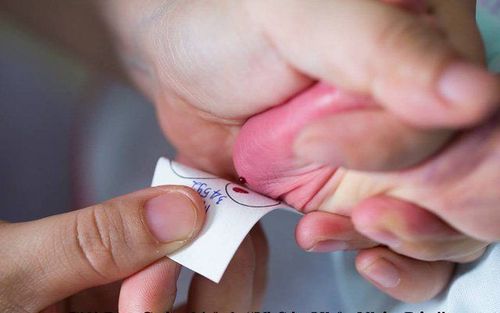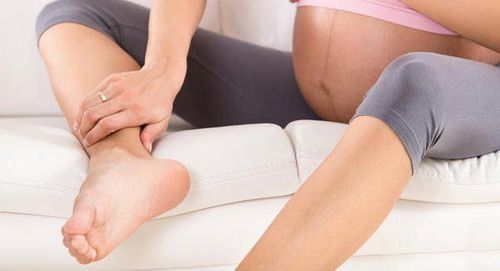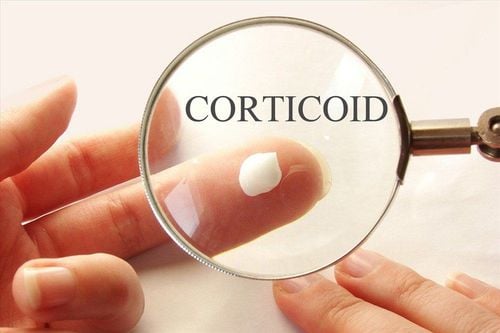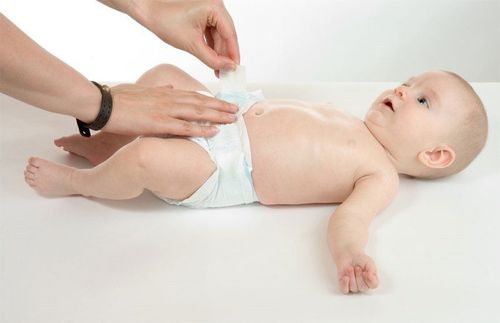This is an automatically translated article.
The article was consulted professionally with Master, Doctor Phan Thi Cam Van - Neonatologist - Department of Pediatrics - Neonatology - Vinmec Danang International General Hospital.When choosing to use cloth diapers, you need to wash them many times to be able to reuse them. In fact, new cloth diapers should be washed at least once before use to increase absorbency. The first step when washing cloth diapers is to check the manufacturer's instructions on the label or packaging.
1. Handling dirty cloth diapers
In general, you can take soiled diapers from a separate container or wet bag and put them directly in the laundry detergent. But soaking a dirty diaper for a few hours before washing can help remove stains better, except for some cloth diapers covered with a waterproof outer layer. You need to read the manufacturer's instructions for washing cloth diapers to learn more.Some families, after changing a dirty cloth diaper, immediately soak it in a container full of water, maybe adding a little baking soda to combat the smell. But this is not recommended by experts for two reasons:
Water-filled pots in the home pose a risk of drowning in young children Soaking diapers for too long can make diapers dirtier, creating a breeding ground for bacteria proliferate. If there are diapers soaked in the bin, empty out all the old water before you start washing cloth diapers.
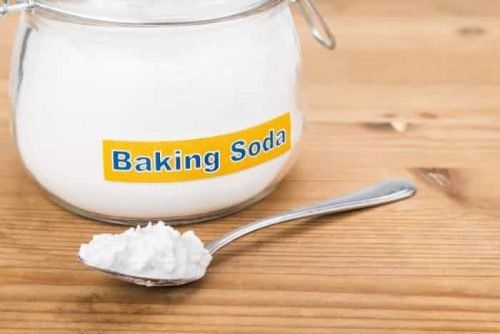
Việc ngâm tã lâu kèm với baking soda có thể khiến vi khuẩn phát triển
2. Products should and should not be used
It is recommended to use detergents (not soaps) that are free of fragrances, enzymes and other additives, including whitening and brightening ingredients. Avoid using fabric softener as it can irritate your baby's sensitive skin and make cloth diapers less absorbent.Sometimes you need to use bleach to disinfect if your baby has a diaper rash or yeast rash. Do not use bleach regularly to avoid breaking the fibers in the diaper, causing the diaper to deteriorate and even damage.
To get rid of odors, some people like to add about half a cup of baking soda or a cup of white vinegar to laundry detergent. In addition to its ability to help deodorize, vinegar also works to soften diapers. But some manufacturers don't recommend this, so double-check the instructions on the packaging.
If you find that the diaper has a build-up of detergent or other unusual problems, such as poor washing, you need to check by washing another item with the same detergent and bleach. Also, do not use too much detergent when washing cloth diapers, only about half of what is normally used for the same amount of clothes.
3. Steps to wash cloth diapers
Dirty diapers should be washed separately from other household clothes. Do not put too many diapers in the washing machine at once to avoid washing dirty cloth diapers, as well as too much friction, which will damage the diaper. For most washing machines, the single capacity holds up to about 20 cloth diapers.Refer to the diaper washing instructions on the package for proper water temperature setting. For example, cotton diapers should be washed in hot water, but some diapers have a waterproof outer shell that will break down in extreme heat. In particular, washing machines with hot water washing mode but too high temperature should not be used in homes with children. Start rinsing with cold water first, then wash a few times in hot water and then wring it out.
Be sure to rinse off the stain and detergent in the diaper. The final washing liquid should be completely soap-free. If not, you need to wash the diaper again. When removed from the washing machine, the diaper should smell new and clean. If there is still a smell of dirty diapers, even if only faintly, you should still wash them. A lingering odor means the diaper contains bacteria, which can irritate your baby's skin or cause a diaper rash.
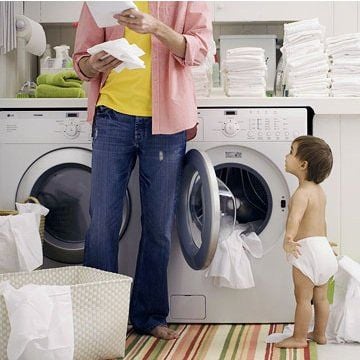
Ba mẹ cần đảm bảo tã vải phải được giặt sạch sẽ
4. Dry cloth diapers
Close all adhesive pads (Velcro buckles) before placing the diaper in the dryer to prevent damage to the diaper. Although most cloth diapers can be machine dried, there are some that cannot withstand the high heat of drying. So check the manufacturer's instructions. Some special handling requirements for cloth diapers are usually hand wash and air dry.Exposure to the sun can make cloth diapers dry faster and whiter, but too much sun can make diapers a little stiff. If this is the case, you can put the diaper in the dryer for a few minutes to soften the fabric. It is best to dry diapers in a well-ventilated area, early in the morning or late afternoon, or dry indoors to help diapers dry faster and softer.
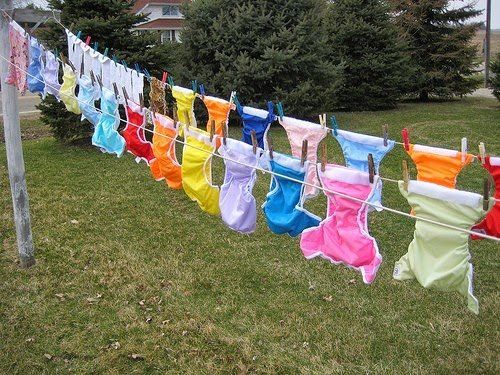
Phơi tã vải dưới ánh nắng mặt trời giúp tã nhanh khô hơn
5. How often to wash cloth diapers
While each person will have an individual laundry schedule tailored to their individual circumstances, most families agree that cloth diapers should be washed every other day. Thus, you do not need to wash every day, but still ensure enough quantity to meet your baby's regular diaper changing needs. A cloth diaper washing schedule every two days also helps keep odors out of control. Usually, dirty diapers will smell bad after a few days of not being treated.If your washing machine can hold 24 diapers at a time, the recommended washing frequency is:
Newborns: Change 12 - 18 diapers a day, 1-2 times a day. Babies 6 - 18 months old: Change 12 diapers a day, once every other day. Toddlers 18 months and older: Change 9 diapers a day, once every other day. Toddlers and potty-trainers: Change 3 - 6 diapers a day, once every other day. Using cloth diapers is an economical and environmentally friendly option. In return, mothers have to learn how to wash cloth diapers and change cloth diapers more complicated than paper diapers.
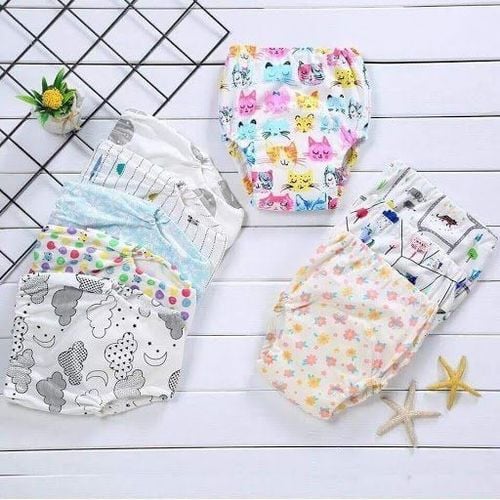
Tã vải giúp ba mẹ tiết kiệm thời gian chăm sóc bé
As a key area of Vinmec Health system, Pediatrics Department always brings satisfaction to customers and is highly appreciated by industry experts with:
Gathering a team of top doctors and nurses in Pediatrics : consists of leading experts with high professional qualifications (professors, associate professors, doctorates, masters), experienced, worked at major hospitals such as Bach Mai, 108.. Doctors All doctors are well-trained, professional, conscientious, knowledgeable about young psychology. Besides domestic pediatricians, the Department of Pediatrics also has the participation of foreign experts (Japan, Singapore, Australia, USA) who are always pioneers in applying the latest and most effective treatment regimens. . Comprehensive services: In the field of Pediatrics, Vinmec provides a chain of continuous medical examination and treatment services from Newborn to Pediatric and Vaccines,... according to international standards to help parents take care of their health. From birth to adulthood Specialized techniques: Vinmec has successfully deployed many specialized techniques to make the treatment of difficult diseases in Pediatrics more effective: neurosurgery - skull surgery, cell transplantation. hematopoietic stem in cancer treatment. Professional care: In addition to understanding children's psychology, Vinmec also pays special attention to the children's play space, helping them to have fun and get used to the hospital's environment, cooperate in treatment, improve the efficiency of medical treatment. Therefore, if parents have difficulties in taking care of their children, they can consult Vinmec International General Hospital for a doctor's advice.
Please dial HOTLINE for more information or register for an appointment HERE. Download MyVinmec app to make appointments faster and to manage your bookings easily.
Reference source: babycenter.com






